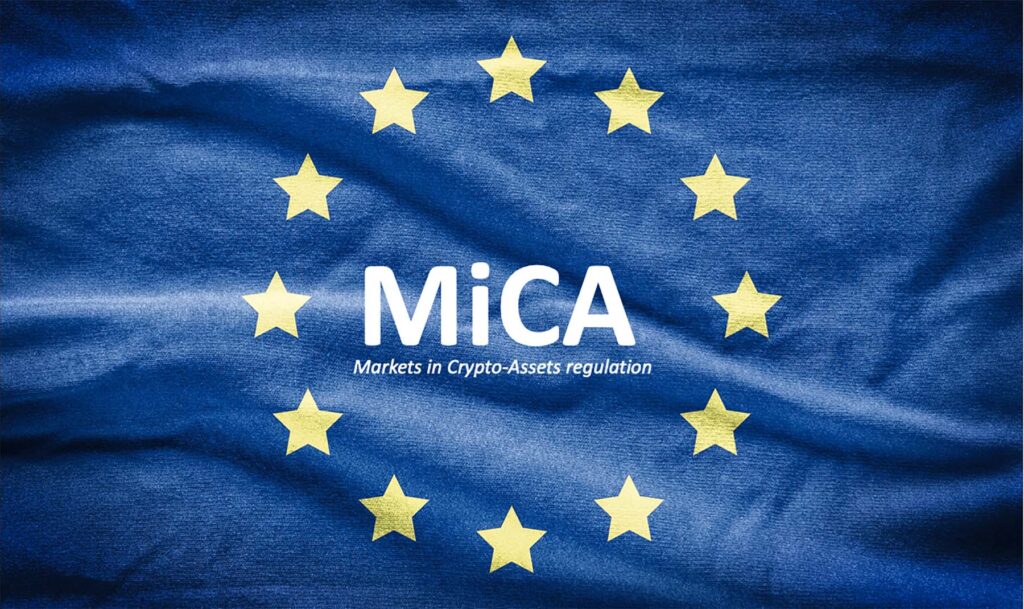
"We value our customers and realize that time is the most valuable resource that we help them save."
Head of International Corporate Law and Fintech Practice
A specialist in the practice of migration and corporate law, he also specializes in legal support for business in EU countries.
New ones rules cryptocurrency market. What has changed with acceptance MiCA.
In April 2023, after years of debate and consultation, the European Parliament finally jumped ship to innovate the train and passed The Markets in Crypto-Assets Act (MiCA) – regulations on comprehensive regulation of crypto asset markets in EU countries.
In May of the same year, it was ratified by the Council on Economic and Financial Issues of the EU and entered into force in June after publication in the Official Journal of the European Union.
It should be noted that the provisions of MiCA do not come into force at the same time, some of them will come into force from 2024 and 2025.
The main purpose of the adoption of this Act is to create a unique, transparent, unified, and safe regulatory environment for all cryptocurrency market participants in the EU, to replace various regulatory acts, clarifications, and interpretations in the legislation of EU states, to define key terms, classification of virtual assets, market participants, guarantee the safety and protection of investors by establishing general and clear rules and strict penalties for violators.
So, in this article, we consider which changes are expected after the adoption of MiCA, the main one’s concepts used in the Act, types of crypto-assets and requirements for their issuers and service providers, as well as other important nuances of the implementation of MiCA norms in EU financial legislation.

Concept and species assets
For further understanding of what and how MiCA regulates, we suggest defining the basic concepts, types of tokens, and entities.
- crypto - asset is an electronic display of value or rights that can be transferred and stored digitally using distributed ledger technology or similar technology;
- distributed ledger technology (DLT) - is a type of technology that supports distributed recording of encrypted data;
- issuer of crypto-assets (issuer of crypto-assets) - a legal entity that offers users any type of crypto-assets or seeks admission of such crypto-assets to a trading platform for crypto-assets.
Kinds tokens
- the token is tied to an asset (asset-referenced token) - a type of crypto-asset, which must maintain a stable value, secured by the value of several fiat currencies that are legal means of payment, one or more goods/ crypto-assets, or their combination;
- electronic money token (e-money token) - secured by the value of fiat currency, which is a legal tender and can be used as a means of payment;
- service token (utility token) - a type of token designed to provide digital access to a product or service available on DLT, and is accepted only by the issuer of this token.
Non-fungible tokens (NFT) are not subject to MiCA if they do not have the characteristics inherent to the tokens specified above.
Also action MiCA not will spread on DeFi - apps, because missing agent.
Suppliers services and species activity
Suppliers services with crypto assets (crypto-asset service provider - САSP) – any person, occupation, or whose business consists in providing one or several services from crypto-assets to third parties on a professional basis, which include:
- storage and administration of crypto assets from name the third persons;
- software functioning commercial site for crypto assets;
- exchange of crypto-assets for fiat currencies that are legal tender or for other crypto-assets;
- placing and implementing errands of crypto assets from name the third persons;
- receiving and transferring orders of crypto assets from named third persons;
- granting consultations of

Suppliers' services have answered the following requirements:
- register legal a person and have an office in one with member countries EU;
- to be authorized as a CASP – to obtain an appropriate license from the competent authority of the EU member state in which the legal entity is registered;
- act fair, rightly, and professionally in the interests of their own customers;
- of safe storage crypto assets customers, outsourcing;
- adhere to politician AML/KYC and opposition financing terrorism;
- prudent, internal control and evaluation risks;
- organizational requirements (members of the governing body of CASP must have the necessary reputation and competence, qualifications, and experience);
- of formation minimal statutory capital
After receiving licenses, CASPs will be able to give services with cryptoassets on the whole territory EU.
It is important to note that the legislator obliges CASPs to identify senders and receivers of crypto-assets regardless of the amount of the transfer, that is, cryptocurrency transactions will be tracked and controlled in the same way as traditional money transfers.
Issuers crypto assets
Legal entities that plan to issue tokens or plan to place them on trading platforms should answer strict requirements provided for supplier’s services, to which also assigned duty to develop and make public detailed plan release and placing tokens - white paper, which must be agreed with the competent authority.
The white paper has contained:
- detailed information about the issuer;
- information about the project, which is planned and realized by score-involved funds;
- proposal to users/investors about conditions of sales tokens;
- rights and duties are related to tokens;
- information about the technology on which based project/token is related to hereby risks
Issuers of tokens tied to assets must have funds in their accounts in the amount of at least 350,000 euros.
Electronic money issuers must have the status of a credit institution or an electronic money institution.
In conclusion, it should be noted that the adoption of MiCA establishes clear and transparent rules, introduces new standards, and will contribute to stability in the cryptocurrency market.
However, one should not forget that the new rules bring new challenges, risks, and obligations for all market participants, and to avoid negative consequences and be ahead of competitors, it is better to prepare in advance.
Given that Ukraine has received the status of a candidate for EU membership, the norms of Ukrainian legislation on the regulation of cryptocurrencies should be harmonized with EU legislation.
Therefore, it is also important for entrepreneurs in Ukraine who plan to develop businesses in the field of cryptocurrencies to be ready for future changes.
The lawyers of the company "Prikhodko and Partners" closely and carefully analyze all legislative innovations in the field of cryptocurrency regulation and are always ready to provide professional legal advice, develop an individual strategy for entering new markets, prepare the necessary documents, register a company and open accounts in banks or payment systems, receive cryptocurrency license or help purchase a ready-made business by conducting a pre- Due Diligence.
Our specialists will quickly and efficiently process your request and offer the best option depending on your needs, capabilities, and wishes.
Calculate the price of assistance:
1 question
Have other lawyers handled your case?
2 question
Are you in Kyiv or Kyiv region?
3 question
Do you need legal assistance urgently?
Head of International Corporate Law and Fintech Practice
A specialist in the practice of migration and corporate law, he also specializes in legal support for business in EU countries.
Other articles on this topic:
call back
during the day




